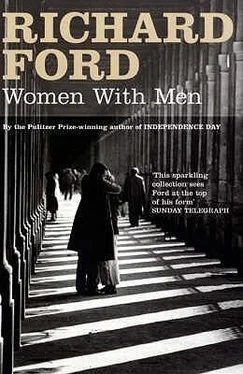Richard Ford - Women with Men
Здесь есть возможность читать онлайн «Richard Ford - Women with Men» весь текст электронной книги совершенно бесплатно (целиком полную версию без сокращений). В некоторых случаях можно слушать аудио, скачать через торрент в формате fb2 и присутствует краткое содержание. Год выпуска: 2006, Издательство: Bloomsbury Publishing PLC, Жанр: Современная проза, на английском языке. Описание произведения, (предисловие) а так же отзывы посетителей доступны на портале библиотеки ЛибКат.
- Название:Women with Men
- Автор:
- Издательство:Bloomsbury Publishing PLC
- Жанр:
- Год:2006
- ISBN:нет данных
- Рейтинг книги:3 / 5. Голосов: 1
-
Избранное:Добавить в избранное
- Отзывы:
-
Ваша оценка:
- 60
- 1
- 2
- 3
- 4
- 5
Women with Men: краткое содержание, описание и аннотация
Предлагаем к чтению аннотацию, описание, краткое содержание или предисловие (зависит от того, что написал сам автор книги «Women with Men»). Если вы не нашли необходимую информацию о книге — напишите в комментариях, мы постараемся отыскать её.
Women with Men — читать онлайн бесплатно полную книгу (весь текст) целиком
Ниже представлен текст книги, разбитый по страницам. Система сохранения места последней прочитанной страницы, позволяет с удобством читать онлайн бесплатно книгу «Women with Men», без необходимости каждый раз заново искать на чём Вы остановились. Поставьте закладку, и сможете в любой момент перейти на страницу, на которой закончили чтение.
Интервал:
Закладка:
As a general matter, they shared a view of themselves as random voyagers who'd faced life's stern blows (Helen had had cancer of the something a year before and was still officially in recovery and on medication; Matthews had, of course, been abandoned). Only they'd emerged stronger, more resolute and no less hopeful of providence and life's abundance. Matthews realized it wasn't typical to fall for an older woman after your wife leaves you. Except he hadn't really fallen for Helen; he simply liked her and liked her way of treating him seriously yet also ironically; whereas Penny had treated him with nothing but the greatest sincerity, sweetness and seemingly loving patience until the day she walked out. He wasn't at all sure what he offered Helen — he couldn't see much — though she seemed happy. The only promise she seemed to want and want to give in return was never to expect anything from the other unless the other was physically present to fulfill it. Marriage, Helen felt, should append this proviso to its solemn vows. Matthews felt the same.
Matthews’ defeated marriage, however, was his great source of disappointment and woe. He had begun The Predicament intending it as a plain yet accurate portrayal of his marriage to Penny, a marriage in which meaningful language had been exhausted by routine, in which life's formalities, grievances and even shouts of pain had become so similar-sounding as to mean little but still seem beyond remedy, and in which the narrator (himself, of course) and his wife were depicted as people who'd logged faults, neglect and misprisions aplenty over twelve years but who still retained sufficient affection to allow them to recognize what they could and couldn't do, and to live in the warmth of that shared understanding. In that way, he felt, it was a typical academic marriage. Other people forged these same accommodations without ever knowing it. His parents, for instance. It was possible they hated each other, yet hating each other was worth more than trying to love somebody else, somebody you'd never know in a hundred years and probably wouldn't like if you did. Better, they'd found, to focus on whatever good was left, set aside all issues they would never agree on, and call it marriage, even love. How to do this was, of course, the predicament. (At one point, he'd come close to calling his book a memoir and not a novel at all.) But having the book published, Matthews had hoped, would be a dramatic and direct public profession of new faith to Penny, who had left town with an undergraduate (not a priest) and taken Lelia to live in the Bay Area. The student had eventually come back to school.
None of this, however, had worked. Penny hadn't read The Predicament, had declined delivery of an early proof Matthews had couriered to her with an inscription, and had almost completely stopped communicating with him. So that at the last minute he revised the Greta part in such a way that instead of coming home to Maine, eager to reconcile, Greta died in a traffic accident.
In the year and a half since Matthews had left teaching, he had finished his novel, seen unwanted divorce proceedings begun against him, sold the white-clapboard, blue-shuttered faculty colonial he'd occupied with Penny, set aside some money and moved miles from campus, into a smaller, brick-and-clay-tile, rough-hewn bungalow in a country setting, where he'd begun getting used to what had departed (conceivably his younger and callower self), what had arrived (not very much), and what the consequences for the future were. The idea of himself as a novelist seemed to be one appealing arrival: a silent artist living obscurely alone in small-town Ohio. Once, he'd been a teacher, but retired early. His wife had left him because he was too eccentric. There had been a child. Occasionally he made a brief appearance in New York, but was mostly content to go on writing small, underappreciated masterpieces that were more popular in Europe than in his own country.
Matthews’ parents still owned a large and successful retail furniture company up in Cleveland — a company that had been in the Matthews name since before the Depression — and there was room for him, if he wanted, to fit right into the management scheme and before long be running things. His father had expressed this hope even after Matthews got tenure, as if teaching literature was widely accepted as an ideal preparation for the furniture business. Matthews’ mother and sister were involved in a profitable interior-design venture connected to the furniture company, and they had made noises about his coming home and taking over the accounts end while they concentrated on the creative decision-making.
But Matthews had told them that he couldn't entertain either of these offers at the moment, that he had more important things on his mind: his divorce, his daughter, his life as a thirty-seven-year-old former professor who knew a great deal about African-American literature and furniture, a man who'd made big mistakes and wanted to make fewer if possible.
His parents had willingly conceded it was a good idea, given the difficult transitions in his life, that he take some time off to “sort things out.” They even acknowledged that writing a novel was sound as a form of therapy before getting down to real life. They seemed to understand about Matthews’ divorce and why it was regrettably necessary, and had made their own private overtures to Penny and Lelia. They had not been especially happy about Helen's unexpected and seemingly impermanent presence in his life, or about her age. But they'd refrained from passing judgment on human adaptations they didn't comprehend but which their only son considered necessary and good. (He frequently brought Helen along on his visits, where she good-naturedly tried to fit herself in, take part and act at ease, though the two of them always stayed downtown in a hotel.)
Nine months after Matthews finished his novel, it had been published by a small, aggressive imprint of a large, prestigious New York house, and once published had gone immediately and completely out of sight. There were a few respectful if insignificant reviews, a few copies were sold. But he quickly lost touch with his editor, and there was never any mention of another contract or of a book he might want to write at a future date. Privately (though he told Helen) he wasn't surprised. He was a novice — a college professor who'd jumped out into the wider world — plus he hadn't believed his novel was really good enough in the way it depicted ordinary, middle-class people caught in the grip of small, internal dilemmas of their own messy concoction. That was not usually a popular subject, he understood, unless the people were lesbians with sexually abusive fathers, or else homicide detectives or someone suffering from a fatal disease — none of which was the case in The Predicament, which was too much about his own life. Still, he was satisfied to have written it, happy to have done it on his own and to have used it to break with teaching. He might, he felt, start thinking of something else to write — something more far-reaching.
Though one gray afternoon in November, just at dusk, he'd received a call from a woman at the publishers in New York (he was on the back porch, reglazing loose panes in his storms before crawling up onto the stepladder). The woman told him that to everyone's pleasure, a French publisher — a Monsieur Blumberg — had called to make an offer on Matthews’ book and wanted to publish it in France if Matthews would agree to a small price.
“I can't think why anybody'd read my book in France,” Matthews said to the publishing woman, Miss Pitkin or Miss Pittman. “Nobody wanted to read it over here.” He was, though, happy that one of his imaginings was coming true.
“You can never tell with the French,” the woman said. “They get things we don't. Maybe it'll turn out better in French.” She laughed a small laugh.
Читать дальшеИнтервал:
Закладка:
Похожие книги на «Women with Men»
Представляем Вашему вниманию похожие книги на «Women with Men» списком для выбора. Мы отобрали схожую по названию и смыслу литературу в надежде предоставить читателям больше вариантов отыскать новые, интересные, ещё непрочитанные произведения.
Обсуждение, отзывы о книге «Women with Men» и просто собственные мнения читателей. Оставьте ваши комментарии, напишите, что Вы думаете о произведении, его смысле или главных героях. Укажите что конкретно понравилось, а что нет, и почему Вы так считаете.












